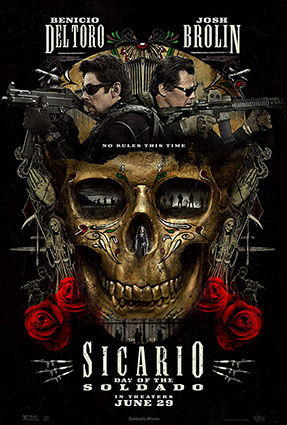![]() The last few minutes of “Sicario: Day of the Soldado” is a single scene that takes place a year after the rest of the film. The scene is emphasised by the very last line of dialogue of the film – a question posed by a taciturn man to a cypher of a character, punctuated by the screen fading to black. It’s clear that director Stefano Sollima and writer Tye Sheridan mean for the moment and the line to be a moment that punctuates everything that has come before. It’s a moment meant to justify the existence of the film in a way that pithy lines have punctuated other kinds of thrillers since movies were movies. It does not work as it’s meant to. Instead of winningly emphasising the ethos of the film that came before, those last minutes instead emphasise the hollow effect of “Soldado” narratively, dramatically and technically. It’s a hollowness that seeps into the fabric of the entire film and erodes the tension that a film like this needs to sustain it.
The last few minutes of “Sicario: Day of the Soldado” is a single scene that takes place a year after the rest of the film. The scene is emphasised by the very last line of dialogue of the film – a question posed by a taciturn man to a cypher of a character, punctuated by the screen fading to black. It’s clear that director Stefano Sollima and writer Tye Sheridan mean for the moment and the line to be a moment that punctuates everything that has come before. It’s a moment meant to justify the existence of the film in a way that pithy lines have punctuated other kinds of thrillers since movies were movies. It does not work as it’s meant to. Instead of winningly emphasising the ethos of the film that came before, those last minutes instead emphasise the hollow effect of “Soldado” narratively, dramatically and technically. It’s a hollowness that seeps into the fabric of the entire film and erodes the tension that a film like this needs to sustain it.
I remember sitting in the theatre when Denis Villeneuve’s “Sicario” opened in 2015. I was in silence as the credits rolled, overwhelmed by the bleak and suffocating worldview in film form. It was a bleakness punctuated by a clear ideological message – the world is corrupt, and everyone’s hands are dirty. It was a clear, and palpable through-line that carried through the entire film buoyed by Emily Blunt’s FBI Agent as an out-of-depth audience surrogate. I will admit slight scepticism at the announcement of a sequel, especially one without Blunt. The original film’s best moments were punctuated by her relationship with the consuming nastiness around her. The finality of “Sicario” seemed to argue against a sequel. What else was there to show about the gloomy world of American law enforcement in Mexico under the guise of stopping drug trafficking? “Soldado”, instead of building on what comes before it, never provides an articulate response.
Amidst the current US government’s detention of mostly Hispanic migrant minors on the borders, the opening moments of “Soldado” feel uncomfortably timely. We watch American border patrol forces as they round up and apprehend migrants illegally crossing the border. The moment is not a mere throwaway because the act of illegal border crossing becomes a key part of the film’s climax. And, yet, the situation and the entire film feels more schematic than decisive. Too many things in “Soldado,” like this opening, seem to happen devoid of emotion or context. Part of this is purposeful.
In “Soldado,” The War on Drugs is merely a cursory placeholder for a situation where American military operatives flex their muscles on criminals south of the border.
It’s a continuation of the overwhelming despair that marked the last half of the original film, but whereas that film seemed hurtling towards a larger point about geopolitical complicity and the underbelly of jingoism and racism, the most perplexing thing in “Soldado” is its relentless futility in search of a reason. It is perplexing because it’s a point its predecessor also made, and troubling because the film seems forced to self-reflexively represent its own futility by being as hollow as the characters it observes.
Josh Brolin and Benicio Del Toro return as the irascible Matt Graver, and the tight-lipped Alejandro Gillick, respectively. Sheridan’s screenplay seems uncertain which one is the protagonist. “Soldado” never truly commits to presenting either of these men, or any of the larger cast of main characters, as being morally justified in their actions. The closest thing to a character to root for is Isbalea Moner as the daughter of a Mexican kingpin who becomes a pawn in a game of political chess as the victim of a kidnapping. The film seems uncertain as to her purpose, a girl headed to a life of pampered superiority by way of kingpin father, or a victim of a corrupt world. Awful people behaving awfully is not an unusual or even unworthy subject for a film. Excellent films have been made on the same structures, but “Soldado’s” inability to evoke empathy or even tension is a liability when there is nothing – or no one – for the audience to hold on to.
Part of this is Sollima’s method of direction. He privileges landscape and architecture over human relationships. It’s not surprising that he began his career as a camera operator in war zones for television networks.
The destructiveness of the wars in “Soldado” are effectively realised, but with no emotional context to support them they have little effect. “Soldado” wears the audience down, and at the end there is nothing to show for it. It never evokes any cogent emotional responses, even fear. And, for a thriller, that’s a problem. There’s a moment very late in the film when a key person gets shot. The moment becomes something of a sleight of hand for a somewhat unsurprising reveal later. When it occurred, though, more than shock at the events unfolding, I felt a weird sort of relief. Finally, it was over. I kept puzzling on my response, and I realised that ultimately beyond the symbols they represent and the way they attempt to push the story forward “Soldado” is punctuated by characters and events that are ill defined and hazily rendered.
If you squint, there may be something to say about the 2018 landscape and the way it has created husks of masculinity and law enforcement. But “Soldado” presents nothing discernible to argue for that and instead all that is there is a hollow depiction of a hollow world with little to care for. It ambles along serviceably but with little gusto. And that is, perhaps, the film’s most unforgiveable quality. It invokes real world issues and flirts with real world crises, but it has nothing persuasive to say about any of it.







